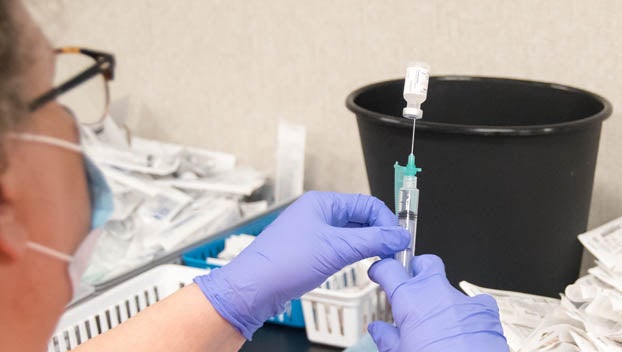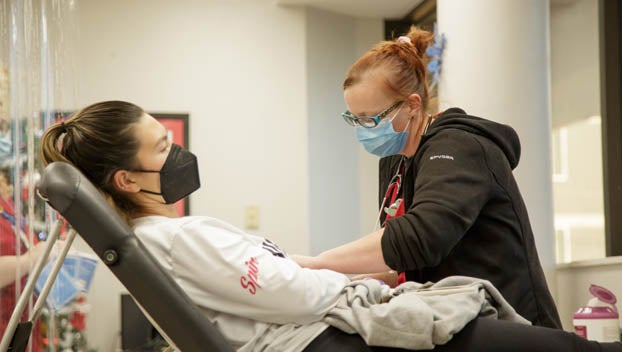As Omicron spreads, expert urges vaccinations
Published 5:26 pm Thursday, December 30, 2021

- (Vidant Health)
|
Getting your Trinity Audio player ready...
|
Vidant Health has seen a spike in COVID-19 cases and hospitalizations over the past month. The hospital system said it saw a 191% increase in the weekly average COVID cases in the region between Nov. 28 and Dec. 28, as well as a 128% increase in the total number of COVID-positive inpatients across the system in that same time frame, with the vast majority of those patients being unvaccinated.
Vidant recorded 685 COVID test results on Nov. 28; of those, 44 (6.4%) were positive. The seven-day moving average percentage was 6.8% at that time. The system recorded 2,619 results on Dec. 28; of those, 706 (27%) were positive, and the seven-day average was 19.8%.
“My pitch and my plea — I use that word very honestly — is to please, please, please, please, please get vaccinated,” Dr. T. Ryan Gallaher, an infectious disease expert with Vidant, said during a call with reporters Thursday. “Again, I implore everybody to do that. We can’t emphasize that enough.
“When I say vaccinated, the value of the booster is extremely effective,” Gallaher added. “I want everybody to remember that. Early data out of the UK and South Africa have shown that the booster, that extra shot, gets you protected from about 33%, roughly, to about 75%. So again, the value of that extra shot is hugely important.”
Gallaher said the Omicron variant is the main cause of the recent surge.
“We continue to see the ever-increasing frequency of Omicron in our sequencing,” Gallaher said. “The exact percentage is hard to know because we sequence them batch at a time, but it is logarithmically increasing. It is safe to say that most of the variants are Omicron at this point.”
In a Dec. 16 update, the Centers for Disease Control and Prevention said Omicron is “likely to be more transmissible” than the original virus that causes COVID-19, but how easily Omicron spreads compared to the Delta variant is unknown. The CDC said vaccines are still expected to protect against severe illnesses, hospitalizations and deaths, and breakthrough infections are likely to occur.
International studies have shown that there is a lesser chance of being hospitalized with an Omicron infection than with the Delta variant.
“In regards to the severity of Omicron, certainly other countries have noticed a case mortality index a little bit lower, which is another way of saying the per patient severity is lower; however, what we’re also seeing unfortunately, because it’s so much more transmissible, that from a general population standpoint we’re seeing more hospitalizations,” Gallaher said. “Just because we’re less severe per patient doesn’t mean it’s going to be less severe as a population.”
HOLIDAYS
Gallaher said holiday gatherings have influenced the surge.
“Usually we see about a two week lag from Thanksgiving,” Gallaher said. “But it’s interesting, with Omicron we’re seeing a shorter incubation period, which means from the time you get exposed to the time you get infected.
“Thanksgiving certainly had something to do with this, but it’s probably not the only factor. I think it’s just part of the whole holidays and Christmas, and everybody just wants to get together and those kinds of things. Again, Omicron has a shorter incubation period, so it’s probably more so the recent holiday, Christmas and the time right up to Christmas.




